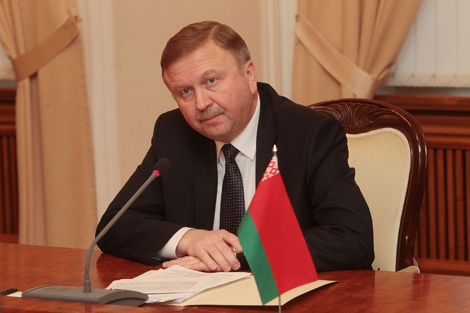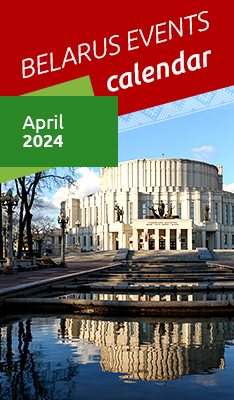Events
Revenues of Belarus’ central state budget expected to grow by 6.2% in 2018
 MINSK, 16 August (BelTA) – The Council of Ministers expects revenues of the central state budget to grow by 6.2% in 2018. Prime Minister of Belarus Andrei Kobyakov made the relevant statement during the session of the Council of Ministers’ Presidium on 16 August, BelTA has learned.
MINSK, 16 August (BelTA) – The Council of Ministers expects revenues of the central state budget to grow by 6.2% in 2018. Prime Minister of Belarus Andrei Kobyakov made the relevant statement during the session of the Council of Ministers’ Presidium on 16 August, BelTA has learned.
Participants of the session reviewed the draft social and economic development forecast, the draft state budget, and the draft major monetary management guidelines for 2018. Speaking about the draft budget, Andrei Kobyakov noted that the instruction to keep it balanced still stands. “We cannot spend more than we earn and we have to live within means. Revenues of the central state budget are expected to grow by 6.2% in 2018,” he said.
According to Andrei Kobyakov, active work on the draft documents has been in progress for four months already. They are based on two scenarios of the Belarusian economy’s development depending on various external and internal conditions. The first scenario is target-driven and has been used to draft Belarus’ social and economic development forecast. A conservative development scenario has been used to calculate the state budget. The forecast documents retain the principles of judging the performance of executives of all levels on the basis of key performance indicators. The most important parameters of the forecast will act as such indicators for the government and the central bank. There are a total of seven of them, noted Andrei Kobyakov.
In line with the target-driven scenario Belarus’ GDP is expected to grow by 3.4%. Labor productivity is expected to rise by 2.8%. Fixed-capital investments are expected to exceed this year’s expected investments by 6.8%. Belarus’ export will expand by 6% while the balance of export and import will be maintained. Belarus is expected to attract $1.45 billion in foreign direct investments. Annual inflation (December against December) will not exceed 7%. Real disposable household income will increase by 3.2% in 2018. These parameters will allow reaching the economic growth trajectory stipulated by the five-year development program. The vertically oriented integrated system of key indicators will be preserved for executives of all levels. The system will focus on quality (financial) indicators, export, and the creation of new jobs, stressed the prime minister.
The Belarusian head of government pointed out the need to keep the next year’s economic development targets compliant with the development targets set by the five-year program. First of all, the balance of payments and the state budget need to be balanced. The financial system, which encourages economic growth, needs to be stable. Andrei Kobyakov stated that all the instruments of the economic policy should be geared towards reaching these goals. The prime minister underlined the need to greatly bolster the competitive ability of Belarusian products and services on foreign markets and reduce the economy’s dependence on fluctuations on markets of raw materials. “Raising export by 6% is a very complicated task to achieve. Growth should be primarily secured by increasing the physical volume of machines and vehicles, agricultural products, and services,” he remarked.
Creating new jobs and new enterprises with active involvement of private capital in the process is another thing to consider. The development of regions with a high manufacturing potential and the relevant infrastructure is also in the center of attention. The prime minister drew attention to the financial rehabilitation of enterprises and economy branches, to the resolution of the long-time problems of credit and loan debts, to revenues of individuals, salaries in the public sector, pensions, the formation of the tariff policy, and the relevant social security measures.
Andrei Kobyakov noted that as far as the tax policy is concerned, the composition and the number of taxes will not be changed. In his words, tax burden on the economy should not grow higher. “We’ve secured noticeable progress in monetary management this year. Interest rates on new loans for the real sector have dropped by 7.6 percentage points this year, with the refinancing rate down to 12% per annum. It is a noticeable decrease. It is important to preserve the reached stability on the currency market and the deposits market of the country. Heads of government agencies, enterprises, and banks should put the bulk of their efforts into finding solutions to the problem of old debts,” concluded Andrei Kobyakov.







 print version
print version make home page
make home page add to bookmarks
add to bookmarks

